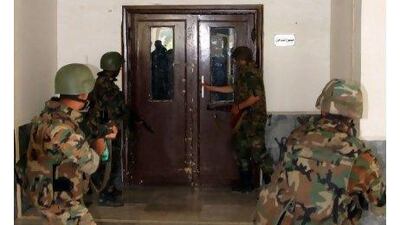DAMASCUS // Syrians on both sides of the political divide are warily eyeing the manoeuvres of world powers, fearful on the one hand of foreign involvement but also hoping to turn it to their advantage.
Iran became the latest country to weigh in yesterday, when the foreign ministry spokesman Ramin Mehmanparast accused western nations and Israel of "doing all they can to crush" Syria, a long-time ally of Tehran.
Mr Mehmanparast warned against any military intervention, called Syria's crisis an internal matter and said the government and people were "politically mature enough to resolve their own issues".
His remarks come after the United States and Britain accused Tehran of helping Damascus to put down the popular uprising, and with the United Nations Security Council considering a resolution condemning Syria for violence against civilians.
With UN-authorised Nato military operations continuing in Libya, the spectre of a similar kind of armed intervention looms over the Syrian crisis, albeit distantly.
No military action has been proposed either by the West, the UN or the Arab League. In fact, the prospect has been all but ruled out by Nato powers, now mired in two expensive, inconclusive wars.
Nonetheless, Syrian analysts say opposition groups and Syria's government are carefully watching conditions in Libya.
"If Qaddafi is finished soon, Syria will start to worry about being next on the list," said one independent political analyst in Damascus.
"For now, the regime thinks it has a window to do what it likes without real international threat because the West is preoccupied. That window may not be open for ever, but the longer Colonel Qaddafi is around, the happier the Syrian regime is."
Anti-government activists insist their best hope for success is for the uprising to remain peaceful, and they appear largely united in not wanting any kind of foreign military intervention, viewing that as part of the nightmare scenario of civil war.
Even if deadly government assaults on demonstrators continue, leading activists have said foreign military action would only make matters worse.
But dissidents and opposition campaigners have welcomed growing criticism of the Syrian authorities by UN agencies, the European Union, United States and international human-rights organisations. Economic sanctions imposed by the US, EU and Switzerland on powerful regime members have also been supported by the protesters.
"The world does have a part to play in Syria, we want to see growing economic pressure and clear moral condemnation of the regime from all countries," said one leading political activist in Damascus.
"But we must be clear that while the international role is important, this uprising will be won or lost inside Syria, by Syrians."
Faced with an unprecedented domestic challenge to their rule, the Syrian authorities have looked for backing to their traditional heavyweight allies, particularly Russia, China and Iran.
Moscow and Beijing have provided political cover, ensuring that Damascus has been spared even verbal criticism from the UN Security Council.
Russia's support for Damascus has not been unequivocal, however; the president, Dmitry Medvedev, says his Syrian counterpart, Bashar al Assad, should "switch from words to actions and conduct real democratic reforms".
Those comments, made at the G8 summit in May, continue to concern pro-regime figures in Syria. "We depend on Russia but that is a dangerous thing to do because Russia can change its position easily," said one supporter of the crackdown on dissidents. "Russia may not stand by us for ever."
Turkey appears already to have left Syria's side, accusing Damascus of "savagery" and opening its borders to thousands of refugees fleeing violence.
Ankara's hardening stance has been all the more dramatic because the prime minister, Recep Tayyip Erdogan, was, at least until recently, a personal friend of the Syrian president.
"It's expected for the Europeans and Americans to be hostile but it is very significant to lose Turkey as an ally," said a Syrian analyst. "If Russia shifts it position, that will make life even more difficult for the regime."
This week's appointment of a Lebanese government is widely seen in Syria as a move by Damascus, which enjoys strong influence over its small Mediterranean neighbour, to shore up its international position. Lebanon holds a seat on the UN Security Council, so its vote in support of Syria will help to offset pressure there.
More importantly, Lebanese support inside the notoriously fractured Arab League will help to prevent any regional consensus forming. The league, which backed Nato military intervention in Libya to protect civilians, has remained silent on Syria, a pivotal county in Middle East politics.
Analysts say instability in Damascus is almost certain to spread to the entire region, with Arab capitals fearing the potentially disastrous consequences involved.
If the international tug-of-war over Syria is currently in a stalemate,, activists believe that will change if hundreds of protesters keep being killed by government security forces. Human-rights groups say that more than 1,300 have died since the March uprising began.
"If the killing continues, Syria will become more isolated politically and economically and the foundations of the regime will be seriously eroded from the inside and from the outside," said one political dissident.
"If that happens, it will find it harder and harder to keep standing."

